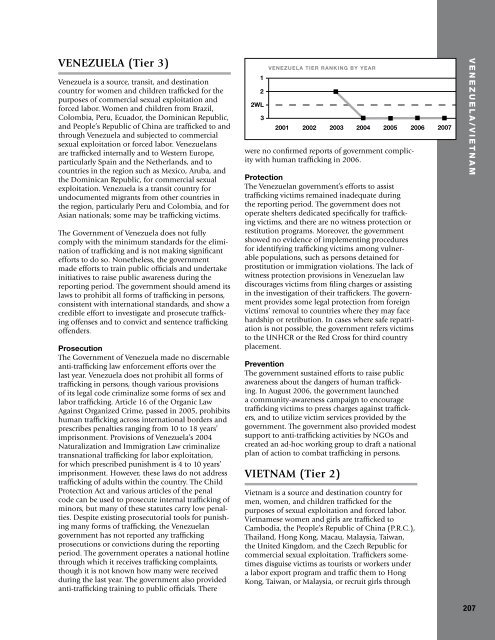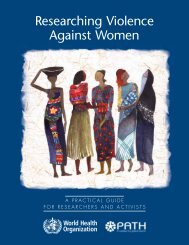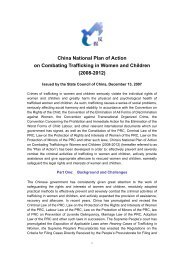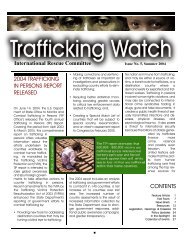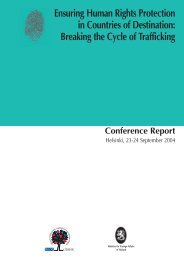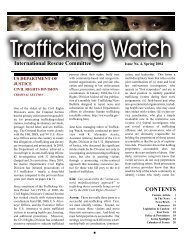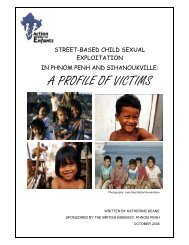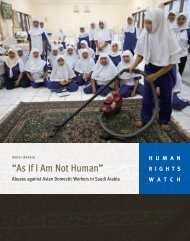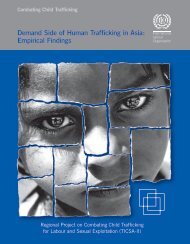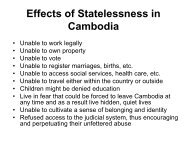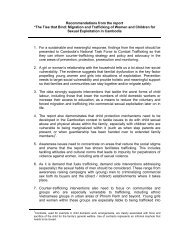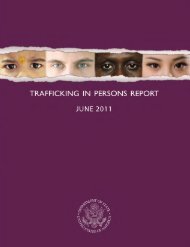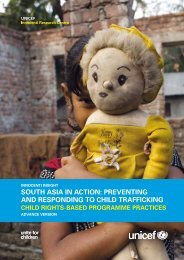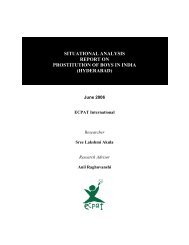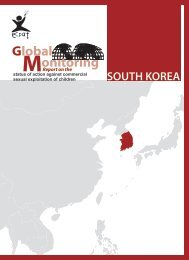2007 Trafficking in Persons Report - Center for Women Policy Studies
2007 Trafficking in Persons Report - Center for Women Policy Studies
2007 Trafficking in Persons Report - Center for Women Policy Studies
Create successful ePaper yourself
Turn your PDF publications into a flip-book with our unique Google optimized e-Paper software.
VENEZUELA (Tier 3)<br />
Venezuela is a source, transit, and dest<strong>in</strong>ation<br />
country <strong>for</strong> women and children trafficked <strong>for</strong> the<br />
purposes of commercial sexual exploitation and<br />
<strong>for</strong>ced labor. <strong>Women</strong> and children from Brazil,<br />
Colombia, Peru, Ecuador, the Dom<strong>in</strong>ican Republic,<br />
and People’s Republic of Ch<strong>in</strong>a are trafficked to and<br />
through Venezuela and subjected to commercial<br />
sexual exploitation or <strong>for</strong>ced labor. Venezuelans<br />
are trafficked <strong>in</strong>ternally and to Western Europe,<br />
particularly Spa<strong>in</strong> and the Netherlands, and to<br />
countries <strong>in</strong> the region such as Mexico, Aruba, and<br />
the Dom<strong>in</strong>ican Republic, <strong>for</strong> commercial sexual<br />
exploitation. Venezuela is a transit country <strong>for</strong><br />
undocumented migrants from other countries <strong>in</strong><br />
the region, particularly Peru and Colombia, and <strong>for</strong><br />
Asian nationals; some may be traffick<strong>in</strong>g victims.<br />
The Government of Venezuela does not fully<br />
comply with the m<strong>in</strong>imum standards <strong>for</strong> the elim<strong>in</strong>ation<br />
of traffick<strong>in</strong>g and is not mak<strong>in</strong>g significant<br />
ef<strong>for</strong>ts to do so. Nonetheless, the government<br />
made ef<strong>for</strong>ts to tra<strong>in</strong> public officials and undertake<br />
<strong>in</strong>itiatives to raise public awareness dur<strong>in</strong>g the<br />
report<strong>in</strong>g period. The government should amend its<br />
laws to prohibit all <strong>for</strong>ms of traffick<strong>in</strong>g <strong>in</strong> persons,<br />
consistent with <strong>in</strong>ternational standards, and show a<br />
credible ef<strong>for</strong>t to <strong>in</strong>vestigate and prosecute traffick<strong>in</strong>g<br />
offenses and to convict and sentence traffick<strong>in</strong>g<br />
offenders.<br />
Prosecution<br />
The Government of Venezuela made no discernable<br />
anti-traffick<strong>in</strong>g law en<strong>for</strong>cement ef<strong>for</strong>ts over the<br />
last year. Venezuela does not prohibit all <strong>for</strong>ms of<br />
traffick<strong>in</strong>g <strong>in</strong> persons, though various provisions<br />
of its legal code crim<strong>in</strong>alize some <strong>for</strong>ms of sex and<br />
labor traffick<strong>in</strong>g. Article 16 of the Organic Law<br />
Aga<strong>in</strong>st Organized Crime, passed <strong>in</strong> 2005, prohibits<br />
human traffick<strong>in</strong>g across <strong>in</strong>ternational borders and<br />
prescribes penalties rang<strong>in</strong>g from 10 to 18 years’<br />
imprisonment. Provisions of Venezuela’s 2004<br />
Naturalization and Immigration Law crim<strong>in</strong>alize<br />
transnational traffick<strong>in</strong>g <strong>for</strong> labor exploitation,<br />
<strong>for</strong> which prescribed punishment is 4 to 10 years’<br />
imprisonment. However, these laws do not address<br />
traffick<strong>in</strong>g of adults with<strong>in</strong> the country. The Child<br />
Protection Act and various articles of the penal<br />
code can be used to prosecute <strong>in</strong>ternal traffick<strong>in</strong>g of<br />
m<strong>in</strong>ors, but many of these statutes carry low penalties.<br />
Despite exist<strong>in</strong>g prosecutorial tools <strong>for</strong> punish<strong>in</strong>g<br />
many <strong>for</strong>ms of traffick<strong>in</strong>g, the Venezuelan<br />
government has not reported any traffick<strong>in</strong>g<br />
prosecutions or convictions dur<strong>in</strong>g the report<strong>in</strong>g<br />
period. The government operates a national hotl<strong>in</strong>e<br />
through which it receives traffick<strong>in</strong>g compla<strong>in</strong>ts,<br />
though it is not known how many were received<br />
dur<strong>in</strong>g the last year. The government also provided<br />
anti-traffick<strong>in</strong>g tra<strong>in</strong><strong>in</strong>g to public officials. There<br />
were no confirmed reports of government complicity<br />
with human traffick<strong>in</strong>g <strong>in</strong> 2006.<br />
Protection<br />
The Venezuelan government’s ef<strong>for</strong>ts to assist<br />
traffick<strong>in</strong>g victims rema<strong>in</strong>ed <strong>in</strong>adequate dur<strong>in</strong>g<br />
the report<strong>in</strong>g period. The government does not<br />
operate shelters dedicated specifically <strong>for</strong> traffick<strong>in</strong>g<br />
victims, and there are no witness protection or<br />
restitution programs. Moreover, the government<br />
showed no evidence of implement<strong>in</strong>g procedures<br />
<strong>for</strong> identify<strong>in</strong>g traffick<strong>in</strong>g victims among vulnerable<br />
populations, such as persons deta<strong>in</strong>ed <strong>for</strong><br />
prostitution or immigration violations. The lack of<br />
witness protection provisions <strong>in</strong> Venezuelan law<br />
discourages victims from fil<strong>in</strong>g charges or assist<strong>in</strong>g<br />
<strong>in</strong> the <strong>in</strong>vestigation of their traffickers. The government<br />
provides some legal protection from <strong>for</strong>eign<br />
victims’ removal to countries where they may face<br />
hardship or retribution. In cases where safe repatriation<br />
is not possible, the government refers victims<br />
to the UNHCR or the Red Cross <strong>for</strong> third country<br />
placement.<br />
Prevention<br />
The government susta<strong>in</strong>ed ef<strong>for</strong>ts to raise public<br />
awareness about the dangers of human traffick<strong>in</strong>g.<br />
In August 2006, the government launched<br />
a community-awareness campaign to encourage<br />
traffick<strong>in</strong>g victims to press charges aga<strong>in</strong>st traffickers,<br />
and to utilize victim services provided by the<br />
government. The government also provided modest<br />
support to anti-traffick<strong>in</strong>g activities by NGOs and<br />
created an ad-hoc work<strong>in</strong>g group to draft a national<br />
plan of action to combat traffick<strong>in</strong>g <strong>in</strong> persons.<br />
VIETNAM (Tier 2)<br />
Vietnam is a source and dest<strong>in</strong>ation country <strong>for</strong><br />
men, women, and children trafficked <strong>for</strong> the<br />
purposes of sexual exploitation and <strong>for</strong>ced labor.<br />
Vietnamese women and girls are trafficked to<br />
Cambodia, the People’s Republic of Ch<strong>in</strong>a (P.R.C.),<br />
Thailand, Hong Kong, Macau, Malaysia, Taiwan,<br />
the United K<strong>in</strong>gdom, and the Czech Republic <strong>for</strong><br />
commercial sexual exploitation. Traffickers sometimes<br />
disguise victims as tourists or workers under<br />
a labor export program and traffic them to Hong<br />
Kong, Taiwan, or Malaysia, or recruit girls through<br />
V E N E Z U E L A / V I E T N A M<br />
207


